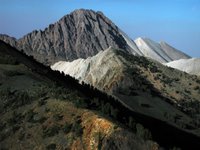The Semantic Web is a concept that seems to be re-emerging as a third generation of the thought about the World Wide Web. Expert or knowledge based computer programs are commonly used by businesses and one would hope by government agencies and community organizations. Clearly the increasing power of computers, search engines, and data base information availability promises to increasingly add a new interactivity to the Internet and the World Wide Web which should help humans address complex natural resource, environmental and ecosystem issues.
I intend to make a few notes now and continue to explore these concepts in much more detail as time permits.
A Wikipedia entry notes that the concept of "An expert system also known as a knowledge based system, is a computer program that contains some of the subject-specific knowledge of one or more human experts. This class of program was first developed by researchers in artificial intelligence during the 1960s and 1970s and applied commercially throughout the 1980s."
An entry note under
Purpose in
Wikipedia for the term Semantic Web notes that in 1999 'Tim
Berners-Lee originally expressed the vision of the semantic web as follows:'
"I have a dream for the Web [in which computers] become capable of analysing all the data on the Web – the content, links, and transactions between people and computers. A ‘Semantic Web’
, which should make this possible, has yet to emerge, but when it does, the day-to-day mechanisms of trade, bureaucracy and our daily lives will be handled by machines talking to machines. The ‘intelligent agents’
people have touted for ages will finally materialize.
" On November 11, 2006, John Markoff wr
ote an article in the New York Times titled, "
Entrepreneurs See a Web Guided by Common Sense." In this article he refers to the emergence of Web 3.0. and he also refers to Tim Berners-Le
e's call for a Semantic Web in 1999.
Of current interest, "
Berners-Lee launches a web science initiative," is the title of an artcle by
Clement James, Vnunet.com
on November 3, 2006. In the beginning of the article James notes that "Tim Berners-Le
e, father of the World Wide Web, has announced the launch of a long-term research collaboration between MIT and the University of Southampton that aims to turn the web itself into a fundamental science.
The Web Science Research Initiative (WSRI) will
generate a research agenda to understand the scientific, technical and social challenges underlying the growth of the web.
Research will focus on the volume of information on the web which documents more and more aspects of human activity and knowledge.
WSRI resea
rch projects will weigh such questions as: 'How do we access information and assess its reliability? By what means may we assure its use complies with social and legal rules? How will we preserve the web over time?' "
